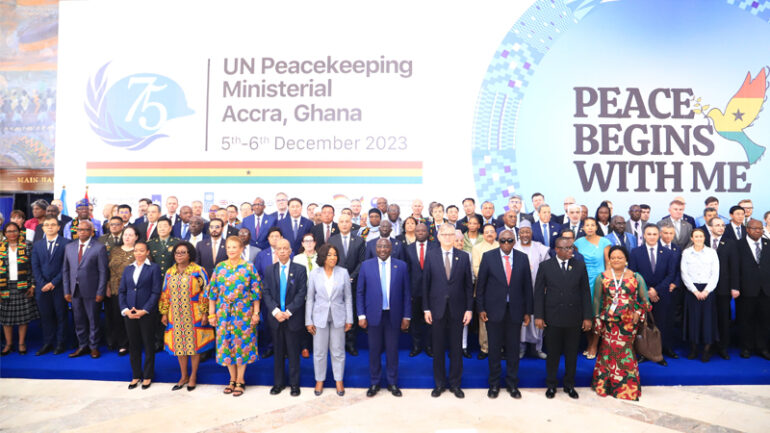Countries uphold commitment to United Nations Peacekeeping at 2023 Ministerial in Ghana

The 2023 United Nations Peacekeeping Ministerial also saw new pledges, including of personnel and training, to meet current and future challenges and needs.
Peacekeepers serve in the world’s most volatile environments and the threats they face are greater than ever, with rising geopolitical tensions, more complex conflict, and the weaponization of digital tools against them and the communities they serve.
Missions are also being given ambitious mandates that are often beyond their capacity to deliver.
Pledging support
A total of 91 countries and three international organizations expressed their collective commitment and political support for peacekeeping at the 2023 Ministerial – the latest in a series of meetings held at the Head of State, Government, or Ministerial level since 2014.
Fifty-seven Member States also announced new pledges to fill critical gaps and strengthen effectiveness in delivering mandated tasks, including preventing violence, protecting civilians, and building peace.
“The concrete pledges generated by this historic event will provide the cushion UN peace operations require to execute complex mandates in complicated environments,” said Ghana’s Minister for Foreign Affairs and Regional Integration, Shirley Ayorkor Botchwey.
Political will critical
UN Under-Secretary-General for Peace Operations, Jean-Pierre Lacroix said the ultimate objective of peacekeeping is to help resolve conflict by supporting parties to secure and implement peace agreements and related political processes.
“Its success, in this regard, over its 75-year history should not be forgotten in the fog of war that continues to ravage the world’s most fragile nations and populations,” he said.
“But peacekeeping is not a magic wand and cannot succeed alone,” Securing sustainable peace requires the political will and active, united engagement of Member States,” he added.
Heeding the call
Delegates responded to the call for stronger political and operational support.
“United Nations Peacekeeping is at a crossroads. A surge in attacks, complex mandates, new conflicts, and old disputes mean that rising to this challenge requires a renewed commitment and robust partnerships, including among Member States,” said the Foreign Minister of Pakistan, Shehryar Akbar Khan.
Representing China, General Qiling Xu called for “true multilateralism” to address the challenges of a world undergoing “transformation and turmoil”.
Kenyan Cabinet Secretary Aden Bare Duae added that missions need the resources and capabilities to deliver on mandates amidst “enormous and evolving” global security challenges.
Meanwhile, Hungary’s Minister for Foreign Affairs and Trade, Peter Szijjarto, called for a greater role for the UN in making and keeping peace given increasing conflicts and threats to global peace.
“If we can improve UN peacekeeping capacity around the world, more armed conflicts will be under control, brought towards peaceful solutions, and the risk of a third world war will be defused,” he said.
Serve with honour
Thirty-three Member States also pledged over 110 new military and police units while 45 states pledged specialized trainings on critical issues such as peacekeeping intelligence, protection of civilians, gender responsive leadership and preventing sexual exploitation and abuse.
“Every peacekeeper must serve with honour, upholding our standards and the image and credibility of the entire UN. This is an essential requirement for acceptance by local communities and to effectively implement our mandates,” said Catherine Pollard, UN Under-Secretary-General for Management Strategy, Policy and Compliance.
“The vast majority of our peacekeepers meet that responsibility. Unfortunately, the terrible actions of a small minority cast a shadow on the honorable work of so many, some of whom have given the ultimate sacrifice.”
Countries also pledged to improve environmental management and to strengthen the strategic communication capacity of UN Peacekeeping, including to address misinformation and disinformation.
In closing the event, Ghana’s Defence Minister Dominic Nitiwul said the relationships formed and commitments made would not be transient. “They are seeds planted for a more peaceful and secure world, the harvest of which we will reap in the years ahead.”
The 2023 UN Peacekeeping Ministerial in Ghana was the first to be held on the African continent. Previous editions took place in the United States, the United Kingdom, Canada and the Republic of Korea.
The 2025 Ministerial will be held in Germany.
Source: UN News
